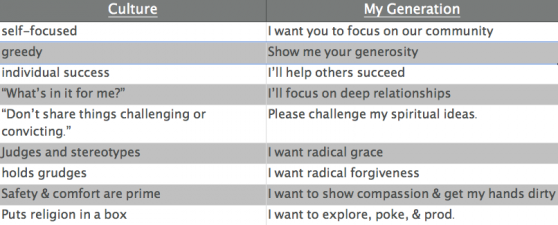My time in seminary was formative for my spiritual, and ministerial, life. I loved my time there, and was an important part of God confirming my call to full-time vocational ministry.

image credit: andynaselli.com
Seminary isn’t for everyone, but it’s incredibly helpful for some. Including me.
But seminary doesn’t teach you everything. It doesn’t fully prepare you for ministry, or tell you what hats you’ll have to wear. If you go in to seminary expecting it’ll give you every tool it takes to lead the Church well, think again. It ain’t happenin’. In fact, I learned a ton working in a coffee shop while in seminary.
10 Things I wish I’d been told in seminary
1. Your involvement in the community is vital.
Finding boards to serve on, roads to clean, and festivals to support shows that you love your community, your culture, and your people. It communicates that you care more than just about your local church, but that you see your local church is a part of a local community. It shows others you’re not just about yourself.
2. Rarely will the rest of the world care about obscure theology as much as you do.
This is the truth. You’ll run in to some young whippersnappers who care about transubstantiation. By and large, though, people won’t “care how much you know until they know how much you care.” (Rick Warren)
3. Leadership is crazy important.
You may be a solid communicator, but if you can’t lead you’ll severely cripple your congregation. You’ll struggle to recruit and keep volunteers, build a healthy staff, and build a healthy church culture. You’ll struggle when the issues you’re brought aren’t black-and-white, and when you can’t simply quote a verse and move on. Leading people through difficulties and change will shape your ministry.
4. People will care more about the application you draw from the text than they will you pontificating on the nuances of the author’s original intent.
This goes along with #2 (above), but it refers specifically to preaching. It’s not wrong that you publicly dive into the technical end of a text, but be sure to make a beeline to how people can apply that truth to their lives. Help people leave knowing what to do with a given Scripture rather than just a few random facts about it.
5. Weddings and funerals aren’t just about preaching the Gospel to people who show up…they’re about building relationships.
I was told about the value and necessity of preaching the Gospel at both weddings and funerals, and that if you don’t do that you’ve failed your calling as a pastor. What I wasn’t told was how important both events are in building real relationships with people in the most emotional times of their lives that they’ll remember more clearly than just about anything else. Building relationships during these events well builds a strong foundation for ministry, and helps garnish trust among people in your church and throughout your community. (because people other than your own church members will show up for these)
6. Remembering names will get you a long way relationally with people.
This should’ve been a class in seminary. Seriously.
7. You’ve got to be internally motivated to succeed as a pastor.
It’s easy to coast. I’ve seen too many guys slip through the cracks on auto pilot. If you’re going to succeed, you’ve got to create traction, recruit, train, invest, and stretch. Nobody else will do that for you.
8. People will constantly look at you for spiritual answers.
Constantly. The more you can give them hope, the better. You won’t have all of the answers, but you’re expected to. Constantly. Giving answers as to “why” is good…giving hope in the midst of pain is better.
9. Seminary is a bubble.
The real world doesn’t think, act, or talk like people do in seminary. If you act like a seminary student the rest of your life, you’ll be pushed to the fringes of real ministry.
10. Who you recruit to be on your leadership team (both staff and laity) will shape your ministry.
This is true whether you’re talking about deacons, elders, small group leaders, or kids ministry volunteers, recruit well. Don’t settle for hiring someone who’s not a fit on your team. Take risks on people, but know that they will shape your ministry.
Question:
Have you been to seminary? What do you wish they’d taught you?










